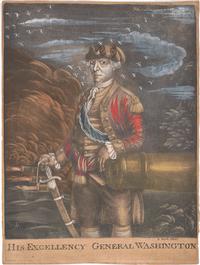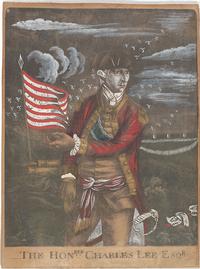Spotlight on Special Collections: Five Unstudied Prints from the American Revolutionary War
By Joe S.Prints were popular in American colonial homes. Among the decorative luxuries available, they were the most affordable. They would be hung in hallways, entrance halls, stairwells, and kitchens. They represented people, places, and events, prior, during, and following the American Revolution. They included portraits honoring those who fought honorably for American Independence. Others were important sources of information and propaganda, serving to promote the Revolutionary cause among colonialists.
The collection, consisting of 18 copper engravings, is part of a larger bequest to the Free Library of Philadelphia from William M. Elkins who died in 1947. The bequest included his major collections of Oliver Goldsmith, Charles Dickens, and Americana, as well as the gift of the room itself with all its furnishings. Some of the engravings are in their original frames and protected by their original glass. They include the works of engravers such as Paul Revere and Amos Doolittle while others had not been identified. Bettina A. Norton, former museum registrar and de-facto curator of prints at the Essex Institute, and Editor Emerita of the Boston Musical Intelligencer, has devoted her career to the study of American graphic arts and architecture. Below is a short summary submitted by Ms. Norton, which encapsulates her recently published article on five unstudied prints in the Free Library's collection.
On the Third Floor of Parkway Central Library is the Rare Book Department’s William McIntire Elkins Library, still looking much as it did when it was on the grounds of Elkins’s Whitemarsh Township estate. The historic wood-paneled room devotes part of one wall to highlight a subset of his Americana collections: 18 prints of leading figures of the American Revolution. Five of these prints were previously not studied, even by experts in American historical prints affiliated with major museums and historical societies. Two prints of George Washington were absent from Charles H. Hart’s epic Catalogue of the Engraved Portraits of Washington, which lists more than 300 early depictions.
As part of the research on my book on Benjamin Blyth, a portrait artist from 18th-century Salem, Massachusetts, I studied the Free Library’s prints. All are mezzotints with a good deal of hand-coloring, and I compared them to work known to have been done by Blyth and two other Salem men, Benjamin’s brother Samuel and silversmith Joseph Hiller. Samuel has long been credited with several prints of American Revolutionary War figures, while both Benjamin and Hiller were believed to have been involved in producing only a few. However, these five prints displayed in the Elkins Room have reversed the second assessment. For a start, one of the two previously unstudied mezzotints of General Washington is signed "B. Blyth." The adept draftsmanship, especially of the landscape and background, eliminated Samuel as a possible creator. The Elkins prints demonstrate that both Benjamin and Joseph Hiller produced more images of American Revolutionary figures than was previously realized.
The story of the contributions of these three men appears in my article in the latest issue of Imprint, the journal of the American Historical Print Collectors’ Society. The essay is excerpted from my upcoming book, Benjamin Blyth, Salem’s 18th-Century Limner. Benjamin Blyth provided original illustrations for a few prints. The medium for which he is well known is pastels, although he also painted in oils and made miniatures. I hope the article and this blog will lead to yet more information on the careers of these three men.
Have a question for Free Library staff? Please submit it to our Ask a Librarian page and receive a response within two business days.



 ca. 1780, mezzotint, hand colored..jpg)